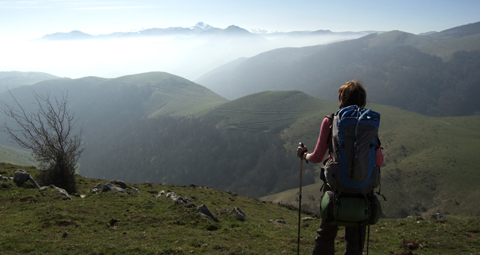September 14 | ![]() 0 COMMENTS
0 COMMENTS ![]() print
print

One step at a time: walking the Way of St James and overcoming life’s demons
Claudia Esnouf speaks to fellow travellers on The Camino, and finds people make the journey for a variety of reasons
HOVERING in the tiny town of Saint-Jean-Pied-de-Port, I wondered how I might gather up the courage to talk to other pilgrims. Luckily, a keen German decided I was good enough company for dinner.
Michael was ex-army, and determined to walk to Santiago in three weeks. He hardly spoke at the table, but as I stood up to leave, he raised his voice. He told me that there are three laws on the Camino: be honest, give or take something up, and cry once—it has to be real. The next day as we set off, Michael muttered something. It was not until I lost sight of him that I gathered what he had said: walk alone.
It’s quite unfathomable to process that you’re about to walk 500 miles in a month. Put an amateur hiker into the equation with a 10kg backpack and questionable physique, and it’s likely she’ll not make it past the first week. Add perseverance and some sense of humour, and it’s likely she will. It’s quite simple really—all you have to do is put one foot in front of the other.
It’s not The Camino that’s a test. What’s a challenge is being able to focus on the journey instead of the life you left behind. It’s worrying about your husband and wondering if he’ll be able to work the oven, or how the office will cope without you for 33 days. The challenge is having the ability to let go of daily routines, and invest in the now.
Letting go means becoming vulnerable again. You’re left with nothing but your raw self to show. Whether you’re a CEO or an 18-year-old student, the hierarchy crumbles and re-shifts itself. What matters now are your social skills, your capacity to wake up at 6.30am with snow outside, your patience to put up with a snoring orchestra at night. It’s not the fittest that will survive: it’s the most determined.
The weather took its toll on the few crazy pilgrims, myself included, who had chosen to walk while the Beast from the East was shaking Europe. There was one particularly bad day, where it rained obstinately for hours on end and the trail became an ocean of mud.
I pushed on, this time accompanied by a painfully shy German boy who hadn’t said a word all day. We walked for six hours in silence together, and I didn’t even know his name. With no town in sight, and with the evening fast approaching, the boy finally spoke.
“How much further?” he pleaded. I looked back at him, having almost forgotten he was there, and realised he was defeated. I had no map, and neither of us had seen the iconic yellow arrows that line the route in hours. As I told him this, his exhaustion reduced him to tears. I fumbled for my phone and pretended to study the dead screen.
“Hang on. It’s only 20 more minutes,” I said.
He perked up. Not only that, but he developed the nerve to ask me if I had any water. I gave him a whole bottle, and after that, his manner changed considerably.
For the next while, he finally talked. His name was Julius, and he was 20 years old. He was from a remote part of Germany where he’d been home-schooled and he was working up the courage to go to university. He started this walk with his father, but the father injured his foot and flew back to Germany.
I realised the father had probably left on purpose, to encourage his son to do precisely this—talk to people. We often think we’re the protagonist of a situation—it’s about you overcoming obstacles and testing yourself. But perhaps we’re also there as a platform for other people to achieve their dreams. On that long afternoon, it was not me who had conquered a fear, but Julius.
Days turned into weeks, and an older man in particular got to me. He was in his 70s, a heavy, shuffling gait, constantly stopping and panting. For three days I had the bad luck of sharing a room with him—a drill would be more peaceful than his snores. Yet every morning he woke up fresh and rested. I grumbled, wondering if I should push on to the next village to avoid him. I did, and just my luck, he did the same.
With the increasing hustle and bustle, I decide to escape to Mass that night. It was only a few of us in the tiny chapel—one of them was my snoring man, only this time he stood fidgeting with a prayer in his hands.
The priest asked us to share our reasons for walking. When it was the snoring man’s turn, I realised he’d fidgeted so much with his prayer, it has torn down the middle. He finally managed to find his voice. He was doing this for his only daughter. She took her own life. He couldn’t understand why.
There’s a monumental feeling that stirs your whole being when you first set eyes on the Santiago de Compostela Cathedral spire looming in the distance. Grins from ear to ear, pilgrims from yesterday greeting those of today, families that have flown in to greet their missing member, and most noticeably, the lone pilgrim who gazes up at the spire in deep, silent satisfaction.
You realise that the point is not the end, but the whole journey that’s now passed. It’s about the people you met, and the moments you shared, and that time you dragged yourself to the top of the hill because even when your body wasn’t on your side, your mind was.
I spent 33 days walking 500 miles solo. I don’t know what it was about me that got me through the relentless rain or the loneliness, but the truth is, I never really felt alone. I had God.
We hadn’t been on close terms for a while, and The Camino brought me back to him. We spoke every day, for hours on end, and when times got tough, he backed me up. It wasn’t always easy. He wasn’t always very fair, and we fell out sometimes. But he was there—my only job was to trust in Him.
Thinking about the people I met on the way, I wonder if the snoring man’s steps got any lighter as he thought about his daughter; I wonder if Julius made a friend, and if Michael, the first pilgrim I met who gave me the three laws, ever really existed.
I don’t think that The Camino is about finding yourself or becoming someone. I think it’s about stripping back all pretences and ego-driven fluff and letting your true self be who it was always meant to be. Go back to your five-year old spirit who cartwheeled on the beach, cycled with no handlebars and waltzed on the streets. Don’t overthink who you are or what you want to do. It’s quite simple really. All you have to do is put one foot in front of the other.










